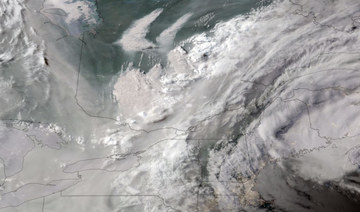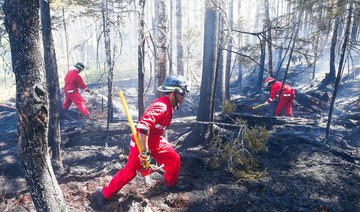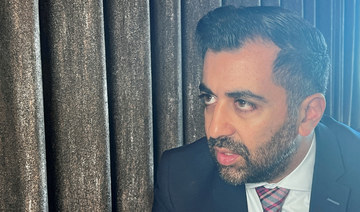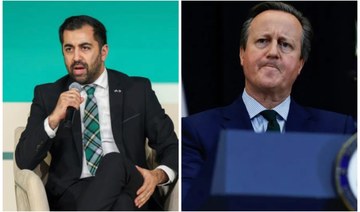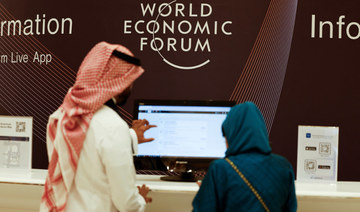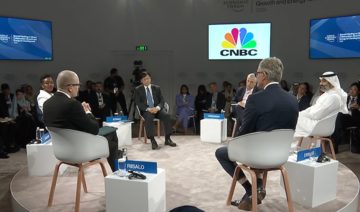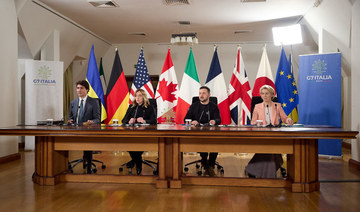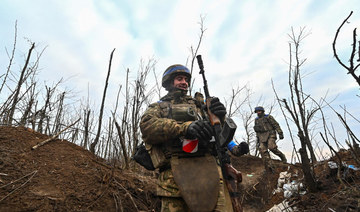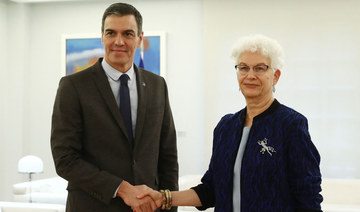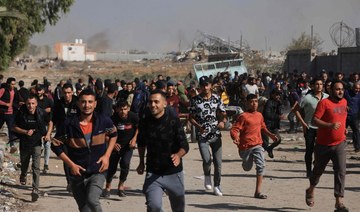NEW YORK: Smoke from Canadian wildfires poured into the US East Coast and Midwest on Wednesday, covering the capitals of both nations in an unhealthy haze, holding up flights at major airports, postponing Major League Baseball games and prompting people to fish out pandemic-era face masks.
Canadian officials asked other countries for additional help fighting more than 400 blazes nationwide that already have displaced 20,000 people. Air with hazardous levels of pollution extended into the New York metropolitan area, central New York state and parts of Pennsylvania and New Jersey. Massive tongues of unhealthy air extended as far as North Carolina and Indiana, affecting millions of people.
“I can taste the air,” Dr. Ken Strumpf said in a Facebook post from Syracuse, New York, which was enveloped in an amber pall. The smoke, he later said by phone, even made him a bit dizzy.
The air quality index, a US Environmental Protection Agency metric for air pollution, exceeded a staggering 400 at times in Syracuse, New York City and Pennsylvania’s Lehigh Valley. A level of 50 or under is considered good; anything over 300 is considered “hazardous,” when even healthy people are advised to curtail outdoor physical activity.
In Baltimore, Debbie Funk sported a blue surgical mask as she and husband, Jack Hughes, took their daily walk around Fort McHenry, a national monument overlooking the Patapsco River. The air hung thick over the water, obscuring the horizon.
“I walked outside this morning, and it was like a waft of smoke,” said Funk.
Canadian officials say this is shaping up to be the nation’s worst wildfire season ever. It started early on drier-than-usual ground and accelerated very quickly, exhausting firefighting resources across the country, fire and environmental officials said.
Smoke from the blazes in various parts of the country has been lapping into the US since last month but intensified with recent fires in Quebec, where about 100 were considered out of control Wednesday — which, unsettlingly, was national Clean Air Day in Canada.
The smoke was so thick in downtown Ottawa, Canada’s capital, that office towers just across the Ottawa River were barely visible. In Toronto, Yili Ma said her hiking plans were canceled and she was forgoing restaurant patios, a beloved Canadian summer tradition.
“I put my mask away for over a year, and now I’m putting on my mask since yesterday,” the 31-year-old lamented.
Quebec Premier François Legault said the province currently has the capacity to fight about 40 fires — and the usual reinforcements from other provinces have been strained by conflagrations in Nova Scotia and elsewhere.
Canadian Interagency Forest Fire Center spokesperson Jennifer Kamau said more than 950 firefighters and other personnel have arrived from the US, Australia, New Zealand and South Africa, and more are due soon.
In Washington, White House press secretary Karine Jean-Pierre said President Joe Biden has sent more than 600 firefighters and equipment to Canada. His administration has contacted some US governors and local officials about providing assistance, she said.
Canadian Prime Minister Justin Trudeau said on Twitter that he spoke by phone with Biden and “thanked him for all the help Americans are providing as we continue to fight these devastating wildfires.”
The largest town in Northern Quebec — Chibougamau, population about 7,500 — was evacuated Tuesday, and Legault said the roughly 4,000 residents of the northern Cree town of Mistissini would likely have to leave Wednesday. But later in the day, Mistissini Chief Michael Petawabano said his community remains safe and asked residents to wait for instructions from Cree officials.
Eastern Quebec got some rain Wednesday, but Montreal-based Environment Canada meteorologist Simon Legault said no significant rain is expected for days in the remote areas of central Quebec where the wildfires are more intense.
US National Weather Service meteorologist Zach Taylor said the current weather pattern in the central and eastern US is essentially funneling in the smoke. Some rain should help clear the air somewhat in the Northeast and Mid-Atlantic this weekend or early next week, though more thorough relief will come from containing or extinguishing the fires, he said.
New York Gov. Kathy Hochul said 1 million N95 masks would be available at state facilities. New York City closed beaches, and Mayor Eric Adams told residents to stay indoors as much as possible as smoke smudged out the skyline. Zoos in the Bronx and Central Park closed early and brought their animals inside.
The Federal Aviation Administration paused some flights bound for LaGuardia Airport and slowed planes to Newark Liberty and Philadelphia because the smoke was limiting visibility. It also contributed to delayed arrivals at Dulles International Airport outside Washington, where a heavy haze shrouded the Washington Monument and forced the cancelation of outdoor tours.
Major League Baseball put off games in New York and Philadelphia, and even an indoor WNBA game in Brooklyn was called off.
On Broadway, “Killing Eve” star Jodie Comer had difficulty breathing and left the matinee of “Prima Facie” after 10 minutes; the show restarted with an understudy, show publicists said. “Hamilton” and “Camelot” canceled Wednesday evening performances, with “Hamilton” publicists saying the the deteriorating air quality “made it impossible for a number of our artists to perform.” In Central Park, the popular outdoor Shakespeare in the Park performances were put off through Friday.
Schools in multiple states canceled sports and other outdoor activities, shifting recess inside. Live horse racing was canceled Wednesday and Thursday at Delaware Park in Wilmington. Organizers of Global Running Day, a virtual 5K, advised participants to adjust their plans according to air quality.
New Jersey closed state offices early, and some political demonstrations in spots from Manhattan to Harrisburg, Pennsylvania, were moved indoors or postponed. Striking Hollywood writers were pulled off picket lines in the New York metropolitan area.
The smoke exacerbated health problems for people such as Vicki Burnett, 67, who has asthma and has had serious bouts with bronchitis.
After taking her dogs out Wednesday morning in Farmington Hills, Michigan, Burnett said, “I came in and started coughing and hopped back into bed.”
Still, she stressed that she’s concerned for Canadians, not just herself.
“It’s unfortunate, and I’m having some problems for it, but there should be help for them,” she said.
Gillies reported from Toronto. Contributing were Associated Press journalists Randall Chase in Dover, Delaware; Michael Hill in Albany, New York; David Koenig in Dallas; Aamer Madhani in Washington; Brooke Schultz in Mechanicsburg, Pennsylvania; Mark Scolforo in Harrisburg, Pennsylvania; Lea Skene in Baltimore; Carolyn Thompson in Buffalo, New York; Ron Todt in Philadelphia; Corey Williams in West Bloomfield, Michigan; and Ron Blum, Mark Kennedy, Jake Offenhartz, Karen Matthews and Julie Walker in New York.
Millions breathing hazardous air as smoke from Canadian wildfires streams south over US
https://arab.news/pjb8e
Millions breathing hazardous air as smoke from Canadian wildfires streams south over US
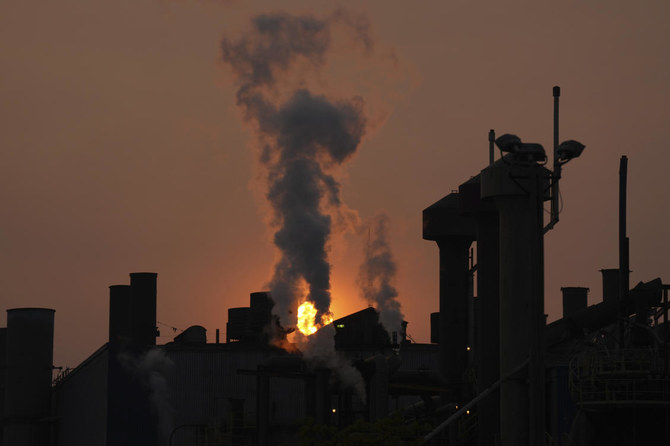
- Smoke from Canadian wildfires is pouring into the US East Coast and Midwest and covering the capitals of both nations in an unhealthy haze
- Canadian officials have expanded evacuation orders and asked other countries for help fighting more than 400 fires nationwide
Scotland’s Yousaf will resign as first minister, BBC says
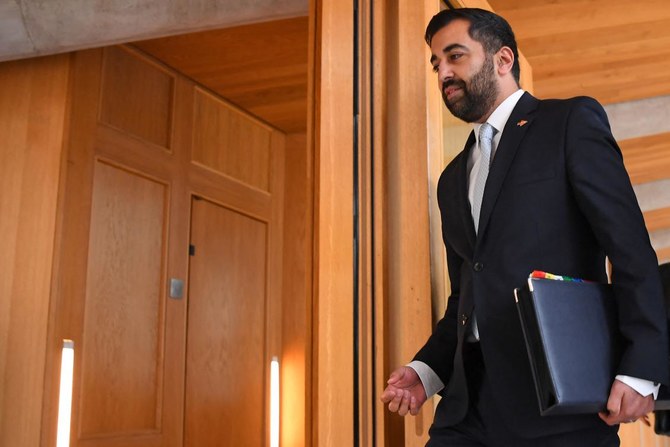
LONDON: Scotland’s first minister Humza Yousaf will resign as early as Monday, the BBC reported, after the possibility of him winning a vote of confidence this week appeared to dwindle over the weekend.
“Scotland’s First Minister Humza Yousaf (is) to resign as early as today, the BBC understands,” BBC News said, without citing a source.
Last week, Yousaf abruptly ended a power-sharing agreement between his Scottish National Party (SNP) and the Green Party, in the hopes that he could lead a minority government — but opposition parties have tabled a vote of no confidence.
The pro-independence SNP’s fortunes have faltered amid a funding scandal and the resignation of a party leader last year, while there has been infighting over how progressive its pitch should be as it seeks to woo back voters.
Just days ago, Yousaf said he was “quite confident” that he could win the no confidence vote called by political opponents, but by Monday, his offer of talks with other parties to try to shore up his minority government seemed to be faltering.
The leadership crisis and a second no-confidence vote against the Scottish government deepens problems faced by Yousaf’s Scottish National Party, which is losing popular support after 17 years of heading the Scottish Government.
Earlier this month, polling firm YouGov said the Labour Party had overtaken the SNP in voting intentions for a Westminster election, for the first time in a decade.
The leader of the Scottish Greens, Patrick Harvie, told BBC radio there was nothing Yousaf could say to persuade his party to support the first minister in the parliamentary confidence vote, leaving Yousaf with few options.
The vote is due to take place later this week.
A victory for Labour in Scotland in Britain’s next national election — expected later this year — would significantly bolster the party’s chances of taking power from Prime Minister Rishi Sunak’s Conservative Party.
If Yousaf loses, parliament would have 28 days to choose a new first minister before an election is forced.
Former SNP leader John Swinney has been approached by senior party figures to become an interim first minister in the event of Yousaf being forced from office, the Times newspaper said, adding that Swinney was reluctant to step up because of personal circumstances.
Yousaf, who previously held health and justice ministerial briefs in the Scottish Government, succeeded former SNP leader Nicola Sturgeon as first minister in March 2023.
She resigned last year and has since been embroiled in a party funding scandal with her husband, who was charged this month with embezzling funds. Both deny wrongdoing.
Global teacher shortage needs more than AI: WEF panelists
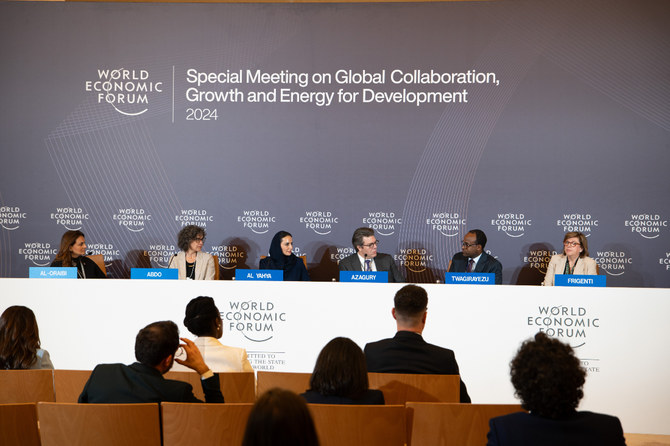
- Tailored solutions required for less-developed nations, says expert
- AI must complement education and training, changing of curricula
RIYADH: The global shortage of teachers will not be remedied solely through the use of artificial intelligence, according to education experts and decision-makers at the World Economic Forum’s Special Meeting in Riyadh.
“Teachers is the biggest problem at the moment for the education sector in low- and middle-income countries,” Laura Frigenti, chief of the Global Partnership for Education platform, told the panel on Sunday.
Gaspard Twagirayezu, Rwanda’s education minister, said that AI can revolutionize education and provide solutions for the global shortage of teachers.
“Of course, AI and technology are not going to replace teachers,” he added. “We can make sure that teachers are properly educated.”
“Here, we are trying to talk about how AI can help in producing education materials for the teachers so that we do not have all these expensive training sessions that we all have to go through.”
Stressing that AI can support teachers in the classroom, Twagirayezu explained that “teachers can be enabled to learn on their own using AI.”
Frigenti said that when it comes to harnessing the power of artificial intelligence in education, “there is not a kind of a one-size-fits-all technology that you can just import into one particular country.”
“You have to start from the conditions of that country and think in terms of a solution,” she continued. If there are no tailored solutions, this would “create a much bigger gap between a part of the world that can invest $8,000 per child per year in education and a part of the world that barely manages to invest $80.”
She added: “And that is going to create all sorts of socio-economic disparities, inequalities within society, (and) inequalities between the Global North and Global South.”
Frigenti added: “We integrate the improvements that technology and AI can add to the way in which the sector performs or is managed to a bigger way of thinking about the sector’s needs to transform, which includes a lot — changing the curricula (and) thinking about what you have to do for the (teachers) problem.”
The panel discussion, titled “Is Education Ready for AI,” featured speakers including Rudayna Abdo, founder and CEO of Thaki; Jack Azagury, group CEO of Accenture; and Deemah Al-Yahya, secretary-general of the Digital Cooperation Organization.
China’s robotic spacecraft headed for moon to carry payload from Pakistan
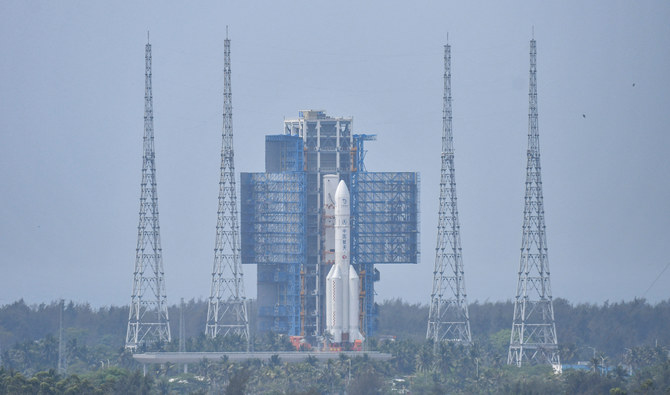
- China will send a robotic spacecraft in coming days on round trip to moon’s far side in first of three missions
- Chang’e-6 spacecraft will carry payloads from countries such as France, Italy, Sweden and Pakistan
BEIJING: China will send a robotic spacecraft in coming days on a round trip to the moon’s far side in the first of three technically demanding missions that will pave the way for an inaugural Chinese crewed landing and a base on the lunar south pole.
Since the first Chang’e mission in 2007, named after the mythical Chinese moon goddess, China has made leaps forward in its lunar exploration, narrowing the technological chasm with the United States and Russia.
In 2020, China brought back samples from the moon’s near side in the first sample retrieval in more than four decades, confirming for the first time it could safely return an uncrewed spacecraft to Earth from the lunar surface.
This week, China is expected to launch Chang’e-6 using the backup spacecraft from the 2020 mission, and collect soil and rocks from the side of the moon that permanently faces away from Earth.
With no direct line of sight with the Earth, Chang’e-6 must rely on a recently deployed relay satellite orbiting the moon during its 53-day mission, including a never-before attempted ascent from the moon’s “hidden” side on its return journey home.
The same relay satellite will support the uncrewed Chang’e-7 and 8 missions in 2026 and 2028, respectively, when China starts to explore the south pole for water and build a rudimentary outpost with Russia. China aims to put its astronauts on the moon by 2030.
Beijing’s polar plans have worried NASA, whose administrator, Bill Nelson, has repeatedly warned that China would claim any water resources as its own. Beijing says it remains committed to cooperation with all nations on building a “shared” future.
On Chang’e-6, China will carry payloads from France, Italy, Sweden and Pakistan, and on Chang’e-7, payloads from Russia, Switzerland and Thailand.
NASA is banned by US law from any collaboration, direct or indirect, with China.
Under the separate NASA-led Artemis program, US astronauts will land near the south pole in 2026, the first humans on the moon since 1972.
“International cooperation is key (to lunar exploration),” Clive Neal, professor of planetary geology at the University of Notre Dame, told Reuters. “It’s just that China and the US aren’t cooperating right now. I hope that will happen.”
SOUTH POLE AMBITIONS
Chang’e 6 will attempt to land on the northeastern side of the vast South Pole-Aitkin Basin, the oldest known impact crater in the solar system.
The southernmost landing ever was carried out in February by IM-1, a joint mission between NASA and the Texas-based private firm Intuitive Machines.
After touchdown at Malapert A, a site near the south pole that was believed to be relatively flat, the spacecraft tilted sharply to one side amid a host of technical problems, reflecting the high-risk nature of lunar landings.
The south pole has been described by scientists as the “golden belt” for lunar exploration.
Polar ice could sustain long-term research bases without relying on expensive resources transported from Earth. India’s Chandrayaan-1 launched in 2008 confirmed the existence of ice inside polar craters.
Chang’e-6’s sample return could also shed more light on the early evolution of the moon and the inner solar system.
The lack of volcanic activity on the moon’s far side means there are more craters not covered by ancient lava flows, preserving materials from the moon’s early formation.
So far, all lunar samples taken by the United States and the former Soviet Union in the 1970s and China in 2020 were from the moon’s near side, where volcanism had been far more active.
Chang’e-6, after a successful landing, will collect about 2 kilograms (4.4 pounds) of samples with a mechanical scoop and a drill.
“If successful, China’s Chang’e-6 mission would be a milestone-making event,” Leonard David, author of “Moon Rush: The New Space Race,” told Reuters. “The robotic reach to the Moon’s far side, and bringing specimens back to Earth, helps fill in the blanks about the still-murky origin of our Moon.”
China firms go ‘underground’ on Russia payments as banks pull back
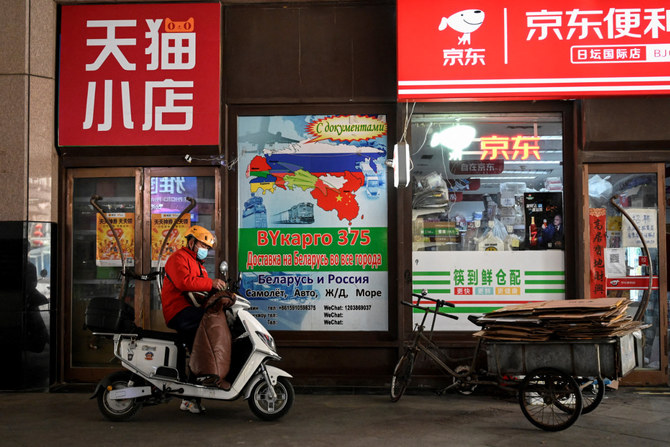
- The US has imposed an array of sanctions on Russia and Russian entities since the country invaded Ukraine in 2022
- Now the threat of extending these to banks in China is chilling the finance that lubricates trade from China to Russia
- Nearly all major Chinese banks have suspended settlements from Russia since the beginning of March, said a manager at a listed electronics company in Guangdong
An appliance maker in southern China is finding it hard to ship its products to Russia, not because of any problems with the gadgets but because China’s big banks are throttling payments for such transactions out of concern over US sanctions.
To settle payments for its electrical goods, the Guangdong-based company is considering using currency brokers active along China’s border with Russia, said the company’s founder, Wang, who asked to be identified only by his family name.
The US has imposed an array of sanctions on Russia and Russian entities since the country invaded Ukraine in 2022.
Now the threat of extending these to banks in China — a country Washington blames for “powering” Moscow’s war effort — is chilling the finance that lubricates even non-military trade from China to Russia.
This is posing a growing problem for small Chinese exporters, said seven trading and banking sources familiar with the situation.

As China’s big banks pull back from financing Russia-related transactions, some Chinese companies are turning to small banks on the border and underground financing channels such as money brokers — even banned cryptocurrency — the sources told Reuters.
Others have retreated entirely from the Russian market, the sources said.
“You simply cannot do business properly using the official channels,” Wang said, as big banks now take months rather than days to clear payments from Russia, forcing him to tap unorthodox payment channels or shrink his business.
Going ‘underground’
A manager at a large state-owned bank he previously used told Wang the lender was worried about possible US sanctions in dealing with Russian transactions, Wang said.
A banker at one of China’s Big Four state banks said it had tightened scrutiny of Russia-related businesses to avert sanctions risk. “The main reason is to avoid unnecessary troubles,” said the banker, who asked not to be named.
Since last month, Chinese banks have intensified their scrutiny of Russia-related transactions or halted business altogether to avoid being targeted by US sanctions, the sources said.
“Transactions between China and Russia will increasingly go through underground channels,” said the head of a trade body in a southeastern province that represents Chinese businesses with Russian interests. “But these methods carry significant risks.”
Making payments in crypto, banned in China since 2021, might be the only option, said a Moscow-based Russian banker, as “it’s impossible to pass through KYC (know-your-customer) at Chinese banks, big or small.”
The sources spoke on condition of anonymity, citing the sensitivity of the topic. Reuters could not determine the extent of transactions that had shifted from major banks to more obscure routes.
China’s foreign ministry is not aware of the practices described by the businesspeople to arrange payments or troubles in settling payments through major Chinese banks, a spokesperson said, referring questions to “the relevant authorities.”
The People’s Bank of China and the National Financial Regulatory Administration, the country’s banking sector regulator, did not respond to Reuters requests for comment.
Sanctions warning
US Secretary of State Antony Blinken, after meeting China’s top diplomat Wang Yi for five and a half hours in Beijing on Friday, said he had expressed “serious concern” that Beijing was “powering Russia’s brutal war of aggression against Ukraine.”
Still, his visit, which included meeting President Xi Jinping, was the latest in a series of steps that have tempered the public acrimony that drove relations between the world’s biggest economies to historic lows last year.
While officials have warned that the United States was ready to take action against Chinese financial institutions facilitating trade in goods with dual civilian and military applications and the US preliminarily has discussed sanctions on some Chinese banks, a US official told Reuters last week Washington does not yet have a plan to implement such measures.
The Chinese foreign ministry spokesperson said, “China does not accept any illegal, unilateral sanctions. Normal trade cooperation between China and Russia is not subject to disruption by any third party.”
A State Department spokesperson, asked about Reuters findings that Chinese banks were curbing payments from Russia and the impact on some Chinese companies, said, “Fuelling Russia’s defense industrial base not only threatens Ukrainian security, it threatens European security.
“Beijing cannot achieve better relations with Europe while supporting the greatest threat to European security since the end of the Cold War,” the spokesperson said.
Blinken made clear to Chinese officials “that ensuring transatlantic security is a core US interest,” the spokesperson said. “If China does not address this problem, the United States will.”
Nearly all major Chinese banks have suspended settlements from Russia since the beginning of March, said a manager at a listed electronics company in Guangdong.
Some of the biggest state-owned lenders have reported drops in Russia-related business, reversing a surge in assets after Russia’s invasion.
Among the Big Four, China Construction Bank posted a drop of 14 percent in its Russian subsidiary’s assets last year and Agricultural Bank of China a 7 percent decline, according to their latest filings.
By contrast, Industrial and Commercial Bank of China , the country’s biggest lender, reported a 43 percent jump in assets of its Russian unit. Bank of China (BOC), the fourth-largest, did not give the breakdown.

‘Channel can be shut’
The four banks did not respond to requests for comment on their Russian businesses or the impact on Chinese companies.
Some rural banks in northeast China along the Russian border can still collect payments, but this has led to a bottleneck, with some businesspeople saying they have been lining up for months to open accounts.
A chemical and machinery company in Jiangsu province has been waiting for three months to open an account at Jilin Hunchun Rural Commercial Bank in the northeastern province of Jilin, said Liu, who works at the firm and also asked to be identified by family name.
Calls to the bank seeking comment went unanswered.
BOC has blocked a payment from Liu’s Russian clients since February, and a bank loan officer said firms exporting heavy equipment face more stringent reviews in receiving payments, Liu said.
The manager at the listed Guangdong company said their firm had opened accounts at seven banks since last month but none agreed to accept payments from Russia.
“We gave up on the Russian market,” the manager said. “We eventually didn’t receive more than 10 million yuan ($1.4 million) in payments from the Russian side, and we just gave up. The process of collecting payments is extremely annoying.”
Wang is also having second thoughts about his Russian business.
“I may gradually shrink my business in Russia as the slow process of collecting money is not good for the company’s liquidity management,” he said.
“What’s more, you don’t know what will happen in the future. The channel can be shut completely one day.”
Pedro Sanchez, a risk-taker with a flair for survival
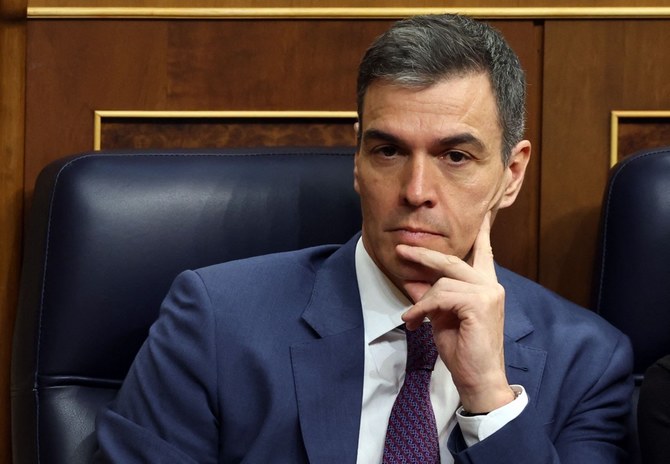
- Sanchez said on Wednesday that he was considering stepping down
MADRID: Spanish Prime Minister Pedro Sanchez, who will on Monday announce whether he remains in his post, is an expert in political survival who has built a career on taking political gambles.
“I have learned to push myself until the referee blows the final whistle,” the head of Spain’s Socialist party and a former basketball player wrote in his 2019 autobiography, “Resistance Manual.”
On Wednesday, he said that he was considering stepping down after a Madrid court announced an investigation into his wife Begona Gomez for alleged influence-peddling and corruption.
“I need to stop and think,” he wrote in a four-page letter posted on X.
With a charming smile and affable personality, the 52-year-old — often referred to as Mr.Handsome early in his career — has been written off politically on several occasions, only to bounce back.
He “has never had it easy,” said Paloma Roman, a political scientist at Madrid’s Complutense University, noting his “political flair” for getting out of complicated situations.
Sanchez emerged from obscurity in 2014 as a little-known MP to seize the reins of Spain’s oldest political party.
A leap-year baby born in Madrid on February 29, 1972, he grew up in a well-off family, the son of an entrepreneur father and civil servant mother.
He studied economics before obtaining a master’s degree in political economy at the Free University of Brussels and a doctorate from a private Spanish university.
Elected to the Socialist Party leadership in 2014, Sanchez’s future was quickly put in doubt after he led the party to its worst-ever electoral defeats in 2015 and 2016.
Ejected from the leadership, he unexpectedly won his job back in a primary in May 2017 after a cross-country campaign in his 2005 Peugeot to rally support.
Within barely a year, the father of two teenage girls took over as premier in June 2018 after an ambitious gamble that saw him topple conservative Popular Party leader Mariano Rajoy in a no-confidence vote.
Always immaculately dressed, the telegenic politician — who likes running and looms over his rivals at 1.90 meters (6 foot 2 inches) tall — has earned a reputation as being tenacious to the point of stubbornness.
Over the past six years, he has had to play a delicate balancing act to stay in power.
In February 2019, the fragile alliance of left-wing factions and pro-independence Basque and Catalan parties that had catapulted him to the premiership cracked, prompting him to call early elections.
Although his Socialists won, they fell short of an absolute majority, and Sanchez was unable to secure support to stay in power, so he called a repeat election later that year.
He was then forced into a marriage of convenience with the hard-left Podemos, despite much gnashing of teeth inside his own party.
Deemed politically dead after his party again suffered a drubbing in local and regional elections in 2023, Sanchez surprised the country by calling an early general election for July.
While his Socialists finished second in the general election, behind the conservative Popular Party (PP), Sanchez cobbled together a majority in parliament with the support of the far-left party Sumar and smaller regional parties, including Catalan separatists.
In exchange for their support, Catalonia’s two main separatist parties demanded a controversial amnesty for hundreds of people facing legal action over their roles in the northeastern region’s failed push for independence in 2017.
Sanchez had previously opposed such a move but he now agreed to it to remain in power, sparking several mass protests staged by the right.
On the international stage, Sanchez, Spain’s first premier fluent in English, has made a name for himself by criticizing the operation Israel launched in Gaza in retaliation for the Hamas attack on October 7, and by promising Spain’s swift recognition of a Palestinian state.



